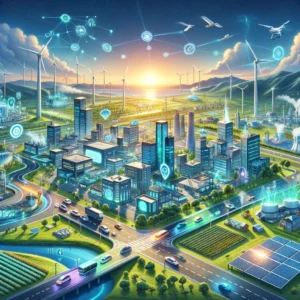- お役立ち記事
- Reducing Energy Efficiency and Environmental Impact The Path Paved by Digital

Reducing Energy Efficiency and Environmental Impact The Path Paved by Digital
In today’s world, where sustainability is no longer just a buzzword but a crucial necessity, industries are under increasing pressure to reduce their energy consumption and environmental impact. With the advent of digital technology, however, a new path has emerged—one paved with promising solutions that can revolutionize how we approach sustainability in manufacturing.
目次
The Challenge: Energy Consumption and Environmental Impact
Manufacturing processes are notorious for their high energy demands and significant environmental footprint. From raw material extraction to production and distribution, each step in the manufacturing journey consumes energy and generates emissions. Traditional methods often rely on inefficient machinery and practices, further exacerbating the problem.
The consequences of unchecked energy consumption and environmental impact are dire. Climate change, resource depletion, and pollution pose significant threats to our planet’s health and future. As stewards of the environment, it is incumbent upon industries to find innovative ways to mitigate these risks and operate more sustainably.
The Digital Revolution: A Game-Changer in Sustainability
Enter digital technology—a powerful ally in the quest for sustainability. From IoT (Internet of Things) sensors to AI (Artificial Intelligence) algorithms, digital solutions offer unprecedented opportunities to optimize energy usage, streamline processes, and minimize waste. Let’s explore some of the ways in which digitization is reshaping the landscape of manufacturing sustainability:
1. Data-Driven Insights
One of the most significant advantages of digital technology is its ability to collect and analyze vast amounts of data in real-time. By deploying sensors throughout the manufacturing facility, companies can gather valuable insights into energy consumption patterns, equipment performance, and environmental impact. This data serves as the foundation for informed decision-making, enabling organizations to identify inefficiencies and implement targeted improvements.
2. Predictive Maintenance
Downtime due to equipment failure not only disrupts production but also consumes unnecessary energy and resources. With predictive maintenance powered by AI, manufacturers can anticipate potential malfunctions before they occur, allowing for proactive repairs and maintenance. By addressing issues proactively, companies can minimize downtime, prolong equipment lifespan, and reduce energy waste.
3. Energy Management Systems
Digital energy management systems offer a comprehensive approach to optimizing energy usage across the manufacturing facility. These systems monitor energy consumption in real-time, identify areas of inefficiency, and automatically adjust settings for maximum efficiency. From lighting and HVAC systems to production machinery, every aspect of energy usage is scrutinized and optimized, resulting in significant cost savings and environmental benefits.
4. Supply Chain Transparency
The journey towards sustainability extends beyond the factory walls and into the broader supply chain. Digital solutions, such as blockchain technology, enable greater transparency and traceability throughout the supply chain. By tracking the origins of raw materials, monitoring transportation routes, and verifying sustainable practices, companies can make more informed decisions and hold suppliers accountable for their environmental impact.
5. Collaborative Robotics
Collaborative robots, or cobots, are revolutionizing the manufacturing industry by combining the precision of automation with the flexibility of human workers. These advanced robots work alongside human operators, performing repetitive tasks with speed and accuracy while minimizing the risk of accidents and injuries. By optimizing workflow and maximizing efficiency, cobots help reduce energy consumption and improve overall productivity.
The Path Forward: Embracing Digital Transformation
As we stand at the intersection of technology and sustainability, the path forward is clear: embrace digital transformation as a catalyst for positive change. By harnessing the power of digital technology, manufacturers can reduce energy consumption, minimize environmental impact, and drive sustainable growth.
However, realizing the full potential of digital solutions requires a concerted effort from all stakeholders. Collaboration between industry leaders, policymakers, and technology providers is essential to overcome barriers and accelerate the adoption of sustainable practices. Together, we can pave the way for a brighter, greener future for generations to come.
In conclusion, reducing energy consumption and environmental impact in manufacturing is not just a lofty ideal—it’s an urgent imperative. Through the innovative use of digital technology, we have the tools and resources to transform our industry and protect the planet we call home. Let’s seize this opportunity and embark on a journey towards a more sustainable future.






